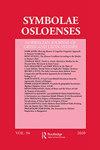A Declamation on a Sopatrian Model: P.Hamb. II 134 Reconsidered
IF 0.1
3区 历史学
0 CLASSICS
引用次数: 0
Abstract
In this paper, we revisit P.Hamb. II 134, which preserves a fragmentary declamation on the familiar aristeus theme, suggest a number of improvements to the text and provide an English translation. We further argue that the speaker in our piece is an aristeus, probably a father, who addresses his son, a deserter, in opposition to recent interpretations that reckon the speaker to be a deserter–father and the addressee to be his aristeus–son. Our interpretation evokes a scenario that is found in Sopater 5.44.27–45.10 Walz. Based on the fragment's content and style, we suggest that either Sopater or his contemporary Libanius could be the author of the lost declamation partially transmitted by this fragment.关于Sopatrian模型的宣言:P.Hamb。II 134重新考虑
在本文中,我们重新审视P.Hamb。II 134保留了对熟悉的阿里斯托斯主题的片断陈述,建议对文本进行一些改进并提供英文翻译。我们进一步认为,我们文章中的说话人是一个阿里斯特,可能是一个父亲,他对他的儿子,一个逃兵说话,与最近的解释相反,认为说话人是一个逃兵父亲,收话人是他的阿里斯特儿子。我们的解释唤起了Sopater 5.44.27-45.10华尔兹中的一个场景。根据碎片的内容和风格,我们认为索帕特或他同时代的利巴纽斯可能是这个碎片部分传播的失落宣言的作者。
本文章由计算机程序翻译,如有差异,请以英文原文为准。
求助全文
约1分钟内获得全文
求助全文

 求助内容:
求助内容: 应助结果提醒方式:
应助结果提醒方式:


